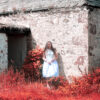There’s a lot of legend and myth surrounding Nico. She was born Christa Päffgen in Germany, though her date of birth has been given both as 1938 and 1943. She died tragically in 1988 after falling off her bicycle in Ibiza. At various points she lived in the UK, mainland Europe and the US. In between there’s a lot of rumour and myth, much of which may never be clarified and adds to the legend.
Certainly, she worked as model and actress before releasing her first single in 1965, ‘I’m Not Saying,’ produced by one Jimmy Page. In 1967, she contributed lead vocals to three tracks on The Velvet Underground And Nico album (‘Femme Fatale,’ ‘All Tomorrow’s Parties’ and ‘I’ll Be Your Mirror’) and backing vocals to another (‘Sunday Morning‘). Around this time she also released her debut album Chelsea Girl, produced by Tom Wilson. She hated it, particularly aggrieved at the inclusion of flutes but a handful of tracks on the (whisper it) beautiful chamber pop record hint at where she might go next.
When people are making those lists of quantum leaps between debut and second albums, 1968’s The Marble Index should be there. In between times she had met the Doors’ singer Jim Morrison who encouraged her to write songs. She composed her music on a harmonium, not a usual instrument in the rock scene, but this helped to forge her distinctive sound. Her voice was distinctive, too, memorably described by rock critic Richard Goldstein as ‘…something like a cello getting up in the morning.’ This is accurate, but it should be taken as a compliment. Her erstwhile bandmate John Cale was on board as producer for both albums, and indeed, 1974’s The End. These three albums are now considered to form a trilogy.
Assuming you still frequent record shops (I hope so; these long out of print albums are being re-issued on vinyl and CD), the chances are you will find them under rock. Yet The Marble Index is avant-garde, more influenced by the ragas of eastern classical music than almost anything that had been heard in the rock spectrum at that point. ‘Lawns Of Dawn’ is not the pastoral beauty you might expect but rather cacophonous. By contrast, ‘No One Is There’ is a beautiful song – Cale’s excellent scoring would be put to good use on his own solo albums over the subsequent half-century.
It’s perhaps best described as being a chilly beauty. It may not be an album you’ll put on regularly but it’s an impressive recording nonetheless. (Listening to this three times over the last couple of days to write the album, I’m not sure I’ll be playing it again for a little while, but I’m impressed by it.) It is re-issued with the previously unreleased tracks ‘Roses In The Snow‘ which is as fantastic as anything on the original album, and ‘Nibelungen‘ features her singing a capella, which she pulls off with aplomb.
1970’s Desertshore is a (comparatively) more accessible album. Less avant-garde, closer to western pop music but still uncompromising, it opens with ‘Janitor Of Lunacy,’ a tribute to her friend Brian Jones of the Rolling Stones who had died the previous year. ‘My Only Child‘ is simply sublime, if you wanted to guide someone into these two records, you might start at this point, it’s similar to choral music, and is simultaneously, distinctively the work of both Cale and Nico.
‘Janitor‘ opens the album, it is forbidding and yet at the same time beguiling. The experience seems like being summoned to stand at the start of a religious ritual, where one is unsure what one should do but watch, silently, feeling utterly exposed. ‘The Falconer‘ by contrast is piano-led and feels nearer to conventional music of the time, without having sacrificed anything of what makes her distinctive. ‘Afraid” a heartfelt ballad makes me wonder if this is what she had been trying to achieve with Chelsea Girl. Of her six albums, this is truly her crowning achievement. While any rock fan can recite Brian Eno‘s quote about that first Velvet Underground record, these thirty minutes are what Nico deserves to be remembered for overall.
Reportedly, the album was recorded in three days; they must have been intense, but what emerges is focused and astonishing, over fifty years later. Yes these albums are intense, neither of them more than thirty minutes long. Had they been recorded in the CD era, I think it is unlikely they would have been much longer, not only because they are a lot to take in, but also because they are so utterly complete in themselves. John Cale was the right producer for the records (Joe Boyd co-produced Desertshore), and The Marble Index was the start of a long and successful career as a record producer (also including the Stooges, Patti Smith and somewhat surprisingly, the Happy Mondays).
Much has been made of those she influenced; Throbbing Gristle covered Desertshore as an art installation in 2007, and Robert Smith described it as one of his favourite albums. You can hear her influence in the voices of Siouxsie Sioux and Bjork, and indeed, these albums predate the goth movement by over a decade. They may not be the most inviting albums initially but they are very much worth spending time with.




